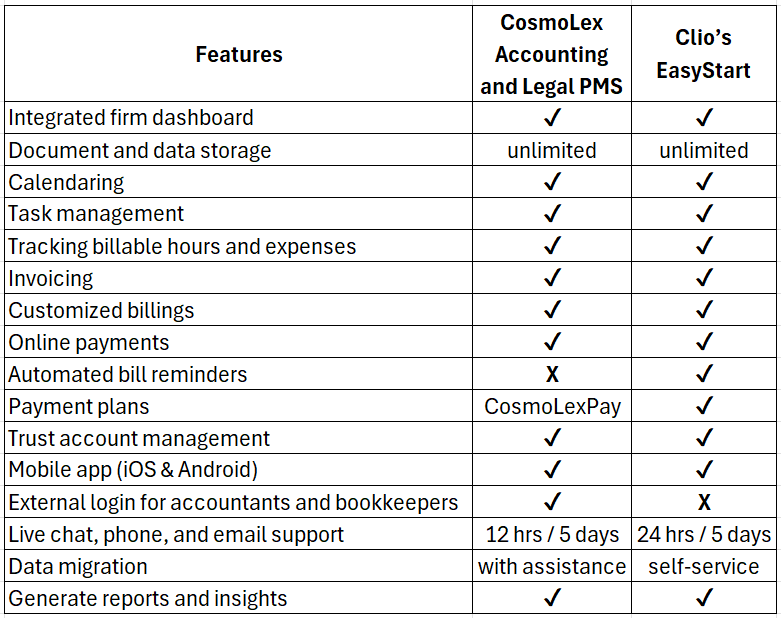Discover the differences and similarities of CosmoLex vs. Clio across different factors, such as their features, subscription plans, and pricing

- What are legal practice management software?
- What are the key features of CosmoLex vs. Clio?
- What are the subscription plans of CosmoLex vs. Clio?
- What support and training do CosmoLex and Clio give to its users?
- How do CosmoLex vs. Clio compare as to subscription costs?
- What is the process of subscribing to CosmoLex and Clio?
- Choosing between CosmoLex vs. Clio
Legal practice management software has proven to be useful in making tasks easier and faster for lawyers and managers of law firms. With the increase of these different legal programs in the market, it’s important to compare them first before buying.
In this article on CosmoLex vs. Clio, we’ll discuss the similarities and differences between these two legal practice management software.
This article is perfect for those who are looking for suitable software for them, or for those who want to switch to CosmoLex or Clio from their current legal software.
Most Read
What are legal practice management software?
Legal practice management software are all-in-one programs that help lawyers and law firms manage their operations.
The goal of these legal solutions is to simplify daily workflows and to finish routine tasks with less mistakes through different tools and features.
Some highlighted features of these legal solutions include:
- tasking and calendaring: to help in the firm’s workflow by organizing the tasks assigned to each lawyer and consolidating everyone’s calendar into one
- case management: to help lawyers organize cases by synchronizing all case documents and client contacts in one place
- client relationship management (CRM): to bridge any communication gaps in a lawyer-client relationship through messaging and document-sharing portals
- time tracking and billing: to help lawyers and firms track billable hours and other expenses, so that clients are accurately billed
- accounting and accounts management: to help firm staff and accountants in managing trust accounts and in doing other accounting tasks
- insights and performance reports: to provide heads of firms with objective reports on the performance of their staff and lawyers
These features are found in two legal solutions: CosmoLex and Clio. Although these differ from one factor to another, there are also similarities between them.
CosmoLex
CosmoLex is one of the cloud-based legal practice management software for lawyers and firms, which integrates the many needs of users just into one software.
This software is developed by ProfitSolv, which also offers other technology-based solutions and other products.
Clio
Clio is another cloud-based legal practice management software. It offers a complete package for law firms of all sizes that need assistance in their business.
It was developed by Themis Solutions Inc., a tech company that focuses on the development of Clio for use not just in North America, but also in other regions.
What are the key features of CosmoLex vs. Clio?
CosmoLex and Clio have similar key features that they offer to subscribers. How one fares out over the other will depend on the liking of the user.
Below is a list of these key features and the ways that CosmoLex and Clio differ:
Legal practice management
Both CosmoLex and Clio put forward their cloud-based practice management software specifically made for the legal field.
Generally, there are many tasks that users can do through this software, such as:
- organize matters, cases, contacts, and tasks all in one place
- manage legal documents, which can now be automated and customized
- automate redundant and mundane tasks to make more time to important ones
It is through the dashboard that everything is tied together. It acts as the central place where users can see all the software’s other features, such as:
- billing, accounting, and payments
- calendar and task management
- case and document management
- CRM and client portal
- internal and client communications
CRM software
CosmoLex and Clio are also CRM software that help build up and maintain the relationship between lawyers and their clients. Their CRM software go by the names CosmoLex CRM and Clio Grow.
From initial engagement until the case is resolved, the CRM software assists with client intake, scheduling of meetings and case-related matters, and billing concerns.
This is in addition to these features:
- customizing online intake forms
- sending e-signature requests
- tagging and categorizing clients per status
- automating tasks (e.g. scheduling appointments, taskings, and sending reminders)
Automated marketing campaigns, such as through texts and emails, can also be managed through their CRM software.
To know more about Clio Grow, watch this video that shows how it works:
Head over to our Clio software review for a detailed look at its features, cost, and ease of use.
Legal billing software
The legal billing software of CosmoLex and Clio allows users to generate bills easily, using the data from its time and expense tracking.
It also lets users send invoices to clients on time electronically, or print a generated invoice and send it through snail mail.
The software also has an automated feature, which helps users save time when billing clients. Invoices can also be customized according to the design of its users.
Both CosmoLex and Clio support format bills according to LEDES (Legal Electronic Data Exchange Standard) and UTBMS codes (Uniform Task-Based Management System).
In CosmoLex, users can also batch-generate all invoices and/or email batch invoices to multiple clients. It also has a unique Money Finder feature that can help track billable items.
Business and trust accounting
CosmoLex and Clio also offer legal accounting software or programs, not just for the business operations of the firm, but also for the trust accounts it holds for its clients.
Through trust accounting, a client’s funds held in trust by firms are properly tracked and monitored, which is also complemented by bank reconciliations.
Because the billing and accounting systems are synchronized in CosmoLex and Clio, data needed for the accounting is easily inserted into it.
Trust accounting of CosmoLex and Clio also features legal compliance with American Bar Association standards.
As for Clio, aside from its trust accounting software that can be tailored for IOLTA transactions, their trust accounting software can also be integrated with QuickBooks.
What are the subscription plans of CosmoLex vs. Clio?
The availability of the key features of CosmoLex and Clio will depend on the subscription plan you sign up for and any add-ons you buy.
The subscription plans between these two solutions are different from each other in this way:
- CosmoLex: offers the CosmoLex Accounting and Legal Practice Management Software (PMS) as its main subscription plan, which can be improved with the following add-ons:
- CosmoLexPay
- CosmoLex CRM
- CosmoLex Websites
- CosmoLex File Sharing and eSignature
- Clio: offers four subscription plans, whose level of available features vary according to price:
- EasyStart
- Essentials
- Advanced
- Complete
CosmoLex Accounting and Legal PMS vs. Clio’s EasyStart
CosmoLex’s Accounting and Legal PMS and Clio’s EasyStart are their basic subscription plans. While the other plans of CosmoLex work as add-ons, Clio has other subscription plans aside from its EasyStart.
The table below compares the features of the two basic plans of CosmoLex and Clio:

CosmoLex’s add-ons
CosmoLex’s add-ons work as complementary features to its main Accounting and Legal PMS, which function differently from each other.
These add-ons are also subject to different pricing (as discussed further below), except for CosmoLexPay which is free of charge but has processing rates whenever used.
CosmoLexPay:
-
- allows clients to pay lawyers or firms through credit cards and other electronic means
- allows users to schedule recurring payments for retained clients
CosmoLex CRM:
- creates intake forms for clients, which are customizable depending on the user’s design and marketing strategy
- allows the automation of workflows to help users complete tasks in an organized manner
- sends automated marketing campaigns, such as text and email drip campaigns
- streamlines the use of e-signatures of clients and lawyers whenever necessary for drafting documents
CosmoLex Websites:
- builds a website for the firm, including its design and content creation
- allows the integration of online payments portal and client portal for retained clients
CosmoLex File Sharing and eSignature:
- provides file sharing and e-signature tools which are integrated into the CosmoLex Legal PMS
This video explains the challenges of law firms when accepting payments through credit cards, and how CosmoLex can help in the process:
Check out our CosmoLex software review for an in-depth look at individual features, subscription costs, and other functions.
Clio’s add-ons
While most of the features of CosmoLex’s add-ons are already in Clio’s other plans (Essentials, Advanced, and Complete), its separate add-ons are the following:
Clio Grow:
-
- provides online client intake forms and online appointment booking tool
- allows automated client emails for unlimited number
- allows workflows for client intake process
- provides referral reporting
- Google's Local Services Ads
Personal Injury (for US only):
-
- organizes medical records
- records all damages of a particular case
- calculate settlement amounts
- HIPAA compliance for recordkeeping
HIPAA liability protection (for US only):
-
- enters into a business associate agreement for data processing
Advanced document automation:
-
- advanced document automation
- access and automatically fill-out court forms
- provides pre-built templates for documents and forms
What support and training do CosmoLex and Clio give to its users?
The support that CosmoLex and Clio provide for its existing users is similar: they both provide live chat, phone, and email support. However, as shown in the table above, it varies as to the time of its availability:
- CosmoLex: 9am to 9pm (for Canada); Monday-Friday
- Clio: 24 hours; Monday-Friday
How do CosmoLex vs. Clio compare as to subscription costs?
The price of subscribing to CosmoLex and Clio is also dependent on the subscription plans that these solutions offer.
Here’s a summary to help interested users in comparing CosmoLex and Clio as for its subscription price:

As for CosmoLexPay, there’s no monthly fee for it, but it is subject to processing rates for transactions done.
For both CosmoLex and Clio, their annual fees are relatively cheaper compared to monthly fees.
Add-ons prices: CosmoLex vs. Clio
The table below shows the prices of add-ons of CosmoLex and Clio:

Here are some points to consider for CosmoLex’s prices of its add-ons:
- CosmoLex Accounting: the firm’s external accountant or bookkeeper can access the firm’s account remotely if they qualify as a CosmoLex Accounting Partner. The firm must consent to this arrangement.
- CosmoLex CRM: users must be full CosmoLex subscribers. Additional users after the first three users can be added at:
- Annual fee: $49 USD / user / month; or
- Monthly fee: $59 USD / user / month; and
- Subject to additional usage fees
- CosmoLex Websites: users must also be full CosmoLex subscribers. Additional features and services are available, subject to additional fees.
- CosmoLex File Sharing and eSignature: the cost decreases as more users are added.
What is the process of subscribing to CosmoLex and Clio?
Both CosmoLex and Clio offer a free trial for interested subscribers:
- CosmoLex: 10-day free trial by clicking the “Try for Free” button on their website
- Clio: 7-day free trial by clicking the “Try Clio for Free” button on their website
After this free trial, users of CosmoLex and Clio can upgrade to the paid subscription of the user’s choosing through their dashboard.
It is only at this point when payment must be made. In Clio, after choosing the subscription plan, the user can then invite other users based on the plan.
In CosmoLex, a prompt will show up on its dashboard for the payment of its subscription plan plus add-ons.
Choosing between CosmoLex vs. Clio
Lawyers – whether solo practitioners or those working in firms of any size – can benefit greatly from legal practice management solutions such as CosmoLex and Clio.
Although some features between these two solutions are different, they are largely the same in terms of the services and features they offer to clients. Both are even part of Canadian Lawyer’s list of the Top Legal Tech, Service Providers, and Products in Canada for 2023.
There are also great differences between the two as to their subscription plans and the prices of these plans. How they roll out their add-ons also varies.
While both CosmoLex and Clio offer a broad range of features for legal practice management, their differences lie in:
- billing functionalities
- integration capabilities (such as with QuickBooks for Clio)
- subscription plans
- add-on options, support hours
- trial periods
These distinctions can guide law firms and solo practitioners in choosing the software that best fits their specific needs, preferences, and operational workflows.
Bookmark our Legal Technology page for more articles on innovative software that can help lawyers and firms with their legal practice.










